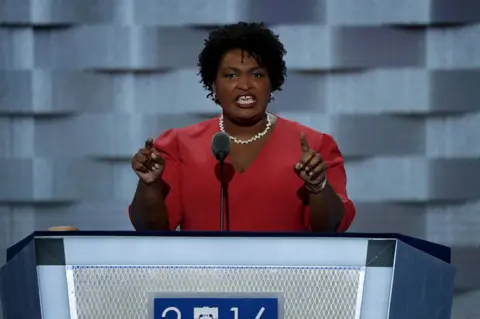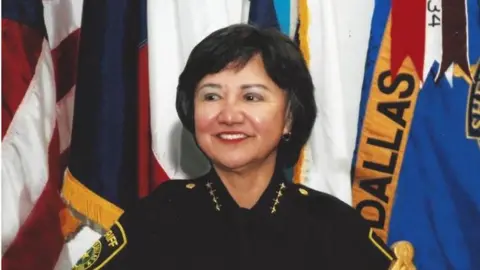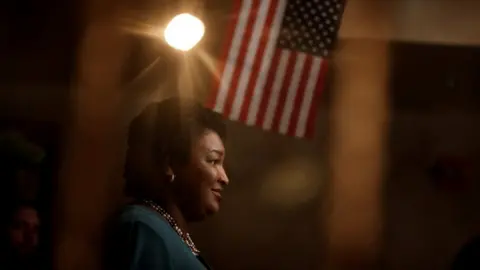Stacey Abrams is first black female nominee for governor
 Getty Images
Getty ImagesA former Georgia lawmaker and author has taken a major step towards becoming the first ever African-American female governor of a US state.
Stacey Abrams won the Democratic Party primary on Tuesday, telling voters that trying to "convert" Republicans into Democrats had previously failed.
A Democrat has not held the red state's governor's mansion since 2003.
Ms Abrams, 44, will face a Republican candidate in the high-stakes mid-term contest in November.
Lt Gov Casey Cagle won the Republican primary on Tuesday, and will face Georgia's secretary of state Brian Kemp in a run-off on 24 July to decide her eventual opponent.
If elected in the deeply conservative state, Ms Abrams would become the first woman and the first person from an ethnic minority to lead the southern state.
 Lupe Valdez For Governor/Facebook
Lupe Valdez For Governor/FacebookA number of women battled for and won their Democratic Party mid-term bids in Kentucky, Arkansas and Texas, highlighting the strength of female candidates in the wake of the #MeToo and #TimesUp movements.
In Texas, Democratic candidate and former Dallas County Sherriff Lupe Valdez became the first openly gay Latina nominee for governor in the state's history.
Also among the winners was political newcomer Amy McGrath, a former fighter pilot, who won a Kentucky primary for a seat in the US Congress.
Allow X content?
"It's more, this time, this climate, right now," Ms McGrath told CNN before her win against Lexington Mayor Jim Gray. "It's very clear that people are looking for more women."
The US currently has six female governors.
Ms Abrams prevailed over Stacey Evans, a 40-year-old state representative, with three-quarters of the vote.
Familiar with 'first'
Ms Abrams was raised in Gulfport, Mississippi, with her five siblings.
She moved to Atlanta as a teenager with her parents, a college librarian and shipyard worker who both attended Emory University to study divinity and become United Methodist ministers.
It was in Georgia where she made her mark with a number of historic achievements.
She became the first African American female valedictorian of her high school before earning her undergraduate degree from Spelman College. She also received a master's degree from the University of Texas and a law degree from Yale University.
Ms Abrams was first elected to the Georgia state House of Representatives in 2006, and would later become the first woman to lead either party in the Georgia General Assembly as well as the first African American to lead the state's House of Representatives.
She has been considered a rising star among her party's progressive wing, taking centre stage at the 2016 Democratic National Convention.
She gave a rousing speech on economic inequality, drawing on her own experience, and strongly backing presidential nominee Hillary Clinton.
 Reuters
ReutersPolitician or romance novelist?
Ms Abrams won the support of Mrs Clinton, who recorded a robocall - an automated telephone call with a recorded message - for the former state House minority leader ahead of Tuesday's election.
Vermont Senator Bernie Sanders, New Jersey Senator Cory Booker, Senator Kirsten Gillibrand and California Senator Kamala Harris - who are all viewed as possible 2020 presidential contenders - also threw their support behind Ms Abrams.
National organisations including Planned Parenthood, MoveOn and EMILY's List have also endorsed Ms Abrams.
Aside from her political work, Ms Abrams has written eight romantic suspense novels under the pen name Selena Montgomery.
She wrote her first book, Rules of Engagement, during her third year at Yale Law School and had originally envisioned it as a spy thriller, she told the Atlanta Journal-Constitution in 2013.

More on the mid-term primaries

Turning Georgia blue
The road to the governor's mansion may not be easy in a state US President Donald Trump won by five points in 2016.
Ms Abrams has come under scrutiny for lending her campaign $50,000 (£37,000) while she owed $50,000 in back taxes, financial disclosures showed.
She penned a piece in Fortune magazine addressing her financial struggles, explaining how her more than $170,000 in student loan and credit card debt and IRS tax payments should not disqualify her as a candidate for Georgia's governor.
